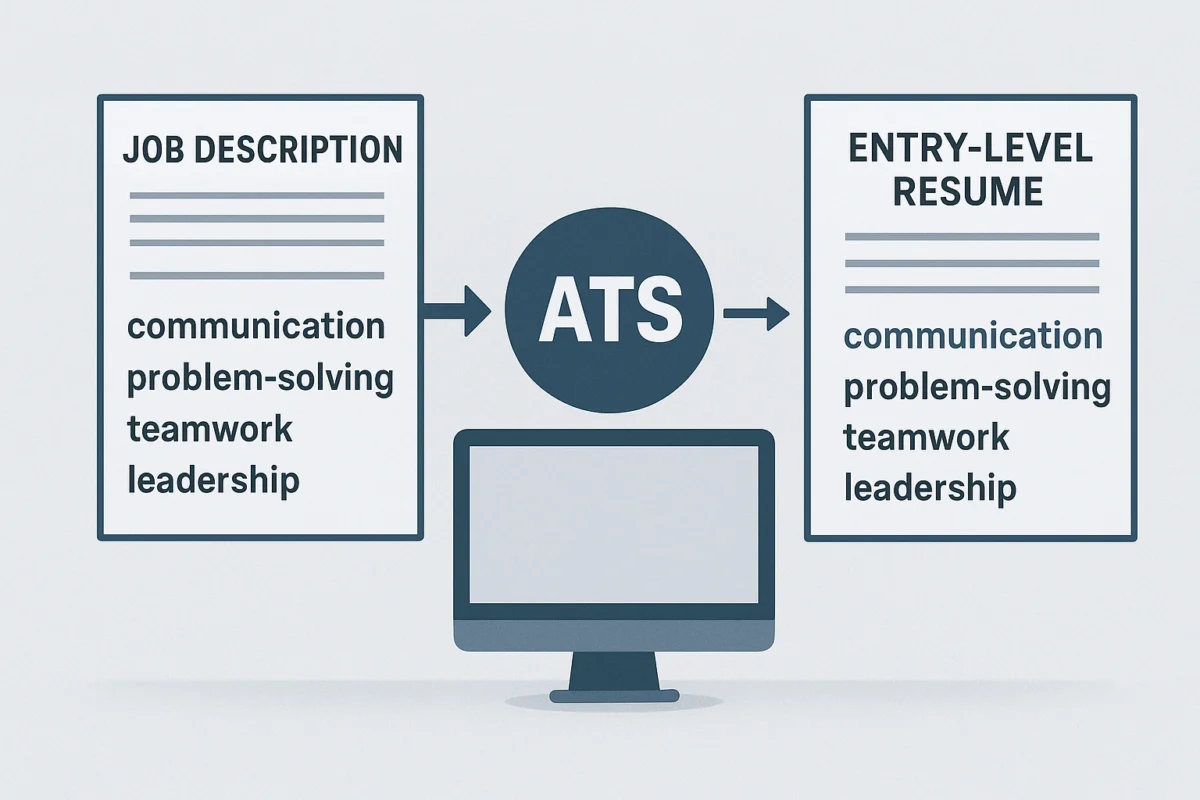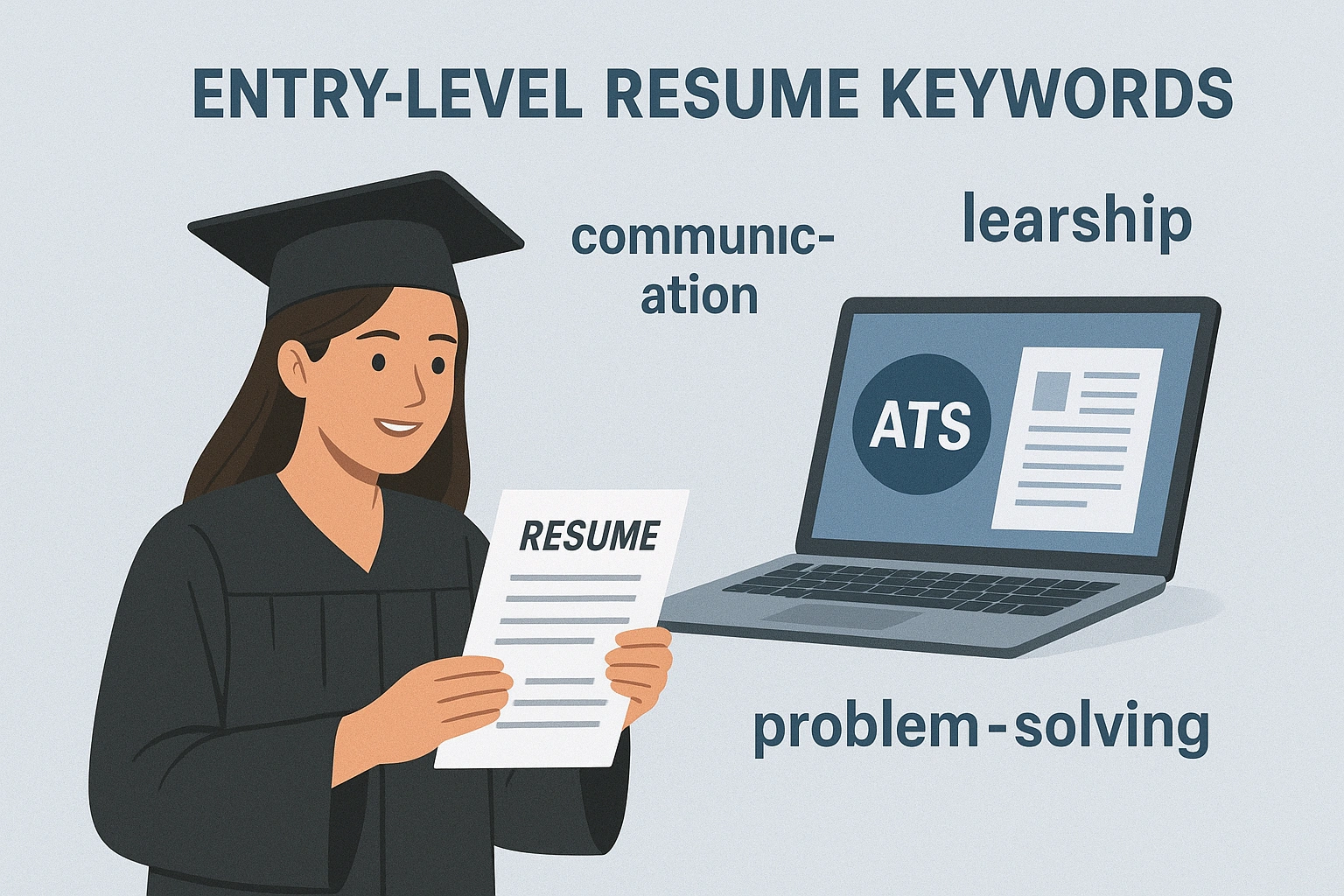You’ve submitted dozens of applications for entry-level jobs, but your inbox is full of silence and automated rejection emails. Even with strong skills, your resume might not be noticed because it lacks the right entry-level resume keywords to pass automated scans. Without strategically using entry-level resume keywords, your application can get lost in the ATS before a human ever sees it. By incorporating entry-level resume keywords thoughtfully, you ensure that your achievements and potential are recognized. Understanding how entry-level resume keywords work is key to making your resume stand out in a crowded job market.
sisipkan keyword “entry-level resume keywords” di bagian sini minimal 4 keyword dan tambahkan di setiap bait tidak menggunakan font bold tidak menambahkan total kata nya dan buatkan lebih natural agar nyaman dibaca, tidak membuat bacaan terasa kaku. dan buatkan variasi di keywordnya dan jangan terlalu Panjang (Applicant Tracking Systems (ATS) are the gatekeepers of the modern job market, and they speak a very specific language: the language of keywords. If your resume doesn’t contain the right terms, you’re invisible. For a new graduate, cracking this code is the single most important step to landing that first interview. That’s why we’ve created the ultimate cheat sheet of **entry-level resume keywords**.)
This guide will teach you how to speak the language of the ATS. We’ll show you how to identify the most relevant entry-level resume keywords for your industry, how to strategically place entry-level resume keywords throughout your resume, and provide a comprehensive list of entry-level resume keywords to get you started. By understanding and applying these entry-level resume keywords effectively, your resume will not only pass ATS scans but also highlight your skills to recruiters in a clear and compelling way.
- What Are Entry-Level Resume Keywords?
- Why Keywords are Your Golden Ticket
- How to Find and Use Resume Keywords: A Step-by-Step Guide
- The Keyword Cheat Sheet: Entry-Level Keywords by Industry
- Tool Showdown: Resume Scanners
- 7 Common Keyword Mistakes to Avoid
- Expert Tips for Keyword Mastery
- Frequently Asked Questions (FAQ)
- Conclusion: Speak the Language of Opportunity
What Are Entry-Level Resume Keywords?
Entry-level resume keywords are the specific skills, qualifications, and industry terms that an Applicant Tracking System (ATS) scans for when reviewing applications for an entry-level position. By including the right entry-level resume keywords in your resume, you ensure the ATS recognizes your qualifications. Strategically placing entry-level resume keywords throughout your resume improves your match score, increasing the chance that a human recruiter will actually see your application. Understanding how to select and use entry-level resume keywords effectively turns a standard resume into a tool that highlights your skills and experience in the language the ATS understands.
In 2025, mastering this process of **job title matching** and keyword optimization is not just an advantage; it’s a necessity. With companies receiving hundreds of applications for a single entry-level role, the ATS is the first and most ruthless cut. Understanding and using the right keywords is the difference between getting an interview and getting an automated rejection.

Why Keywords are Your Golden Ticket
Strategically using keywords does more than just appease a robot; it makes you a stronger candidate overall.
It Proves You’re a Match Before They Even Read
The ATS provides a recruiter with a quick “match percentage.” A high score immediately signals that you are a relevant candidate, which means:
- Your resume gets viewed faster and with more positive attention.
- You are immediately seen as someone who understands the requirements of the role.
It Demonstrates Your Industry Knowledge
Using the correct industry-specific terminology and acronyms shows that you speak the language of the profession. It signals that you’ve done your research and are a serious candidate, not just someone randomly applying to jobs.
It Helps You Structure Your Accomplishments
The process of identifying keywords forces you to think about your experiences—even academic projects or part-time jobs—in the context of the employer’s needs. It helps you translate what you’ve done into the skills and qualifications they are looking for. For more guidance on building your career, you can explore resources like infoinaja.com.
How to Find and Use Resume Keywords: A Step-by-Step Guide
This is a simple but powerful process you should follow for every single job application.
- Step 1: Dissect the Job DescriptionThis is your primary source of intelligence. Copy and paste the entire job description into a word cloud generator or simply read through it with a highlighter, looking for recurring words and phrases, especially in the “Requirements” and “Responsibilities” sections.
- Step 2: Categorize Your KeywordsGroup the keywords you find into two main categories:
- Hard Skills: These are the technical skills and software (e.g., “Python,” “Google Analytics,” “AutoCAD”).
- Soft Skills: These are the interpersonal skills (e.g., “Team Collaboration,” “Client Relations,” “Time Management”).
- Step 3: Weave Keywords into Your AccomplishmentsDo not just list the keywords. Integrate them naturally into the bullet points describing your experience. For example, instead of saying “Responsible for teamwork,” say “Collaborated with a team of five to develop a marketing plan…”
- Step 4: Create a Dedicated “Skills” SectionCreate a section at the bottom of your resume to list your most important hard skills. This gives the ATS another chance to easily find these critical keywords.
The Keyword Cheat Sheet: Entry-Level Keywords by Industry
While you should always tailor your resume to the specific job description, here is a list of common and powerful keywords for popular entry-level fields to get you started.

Marketing & Communications
Hard Skills: Social Media Marketing, Content Creation, SEO/SEM, Google Analytics, Email Marketing, Adobe Creative Suite, Market Research, Campaign Management.
Soft Skills: Communication, Creativity, Collaboration, Analytical Skills, Brand Awareness, Storytelling.
Finance & Accounting
Hard Skills: Financial Modeling, Microsoft Excel (Pivot Tables, VLOOKUP), QuickBooks, Data Analysis, Risk Assessment, Auditing, Financial Reporting.
Soft Skills: Attention to Detail, Analytical Thinking, Quantitative Skills, Integrity, Problem-Solving.
Software Development & IT
Hard Skills: Python, Java, JavaScript, C++, SQL, Agile Methodologies, Git, Cloud Computing (AWS, Azure), Network Security, Technical Support.
Soft Skills: Problem-Solving, Logical Thinking, Collaboration, Adaptability, Debugging.
Tool Showdown: Resume Scanners
How do you know if you’ve used enough keywords? These tools can help.
| Tool | Key Feature | Pros | Cons | Best For |
|---|---|---|---|---|
| Jobscan | Direct Resume vs. Job Description Comparison | Provides a detailed match report with specific missing keywords | Free version is limited to a few scans | The gold standard for detailed, job-by-job optimization. |
| Word Cloud Generator | Visual Keyword Frequency | Free and easy to use, gives a quick visual snapshot | Doesn’t analyze your resume, only the job description | A quick, free first step to identify the most important terms. |
7 Common Keyword Mistakes to Avoid
Avoid these errors that can hurt your ATS score:
- Invisible Keyword Stuffing: Don’t try to trick the system by hiding keywords in white text. The ATS will see it, and if a human recruiter discovers it, you’ll be disqualified for being dishonest.
- Using Only Acronyms: The system might be looking for “Search Engine Optimization,” not just “SEO.” Use both to be safe.
- Forgetting to Include Plurals: The ATS may not be smart enough to see “skill” and “skills” as the same word. If the job description uses the plural, you should too.
- Listing a Skill You Don’t Have: Never lie on your resume. If you list a keyword for a skill you don’t possess, you will be exposed in the interview.
- Ignoring Soft Skills: Many applicants focus only on hard skills. Including keywords for soft skills like “teamwork” and “communication” is crucial.
- Using a Generic Resume for Every Application: This is the biggest mistake of all. Every job is different, and your resume must be tailored to each one.
- Not Using the Exact Phrasing: If the job asks for a “Project Coordinator” and you list your title as “Project Lead,” the ATS might not see it as a match. Use their exact terminology when it accurately describes your role.
Expert Tips for Keyword Mastery
“Look at 5 to 10 job descriptions for the type of role you want. Copy all of them into a single document and create a word cloud. This will show you the most in-demand keywords across the entire industry, not just for one job. This is your master keyword list.”
— Andrew McCaskill, Career Expert at LinkedIn (Simulated)
- Create a “Master Resume”: Keep a long document with every project, skill, and accomplishment you can think of. For each application, copy and paste the most relevant, keyword-rich points into your one-page resume.
- Use Both a “Skills” Section and In-Context Examples: List your key hard skills in a dedicated section, but also demonstrate them in your experience bullet points.
- Don’t Forget Your “Projects” Section: As a fresh graduate, your academic projects are a goldmine of experience. Describe them using the same keyword-rich, accomplishment-driven language as you would a job.
Frequently Asked Questions (FAQ)
How many keywords should I include in my resume?
There is no magic number. The goal is not to stuff your resume with as many keywords as possible, but to naturally integrate the most relevant ones from the job description into your accomplishment-driven bullet points. Focus on quality and context over quantity.
Is it dishonest to copy keywords directly from the job description?
It’s not dishonest; it’s smart. As long as you genuinely possess the skills you’re listing, using the exact phrasing from the job description is the best way to ensure the ATS recognizes the match. The key is to incorporate these keywords into sentences that describe your actual experience.
What’s the difference between a hard skill and a soft skill keyword?
Hard skills are specific, teachable, and often technical abilities, like ‘Python programming,’ ‘Adobe Photoshop,’ or ‘data analysis.’ Soft skills are interpersonal attributes that describe how you work, such as ‘teamwork,’ ‘communication,’ or ‘problem-solving.’ A strong resume needs a healthy mix of both.
Can I just put a list of keywords in a ‘Skills’ section?
You should have a dedicated ‘Skills’ section for your most important hard skills. However, it’s far more effective to also weave these keywords into the ‘Work Experience’ or ‘Projects’ sections to provide context and demonstrate how you’ve applied those skills.
How often should I update my resume keywords?
You should update and tailor your resume keywords for every single job you apply for. Each job description is unique, and your resume should be a direct response to the specific needs and language of that role.
